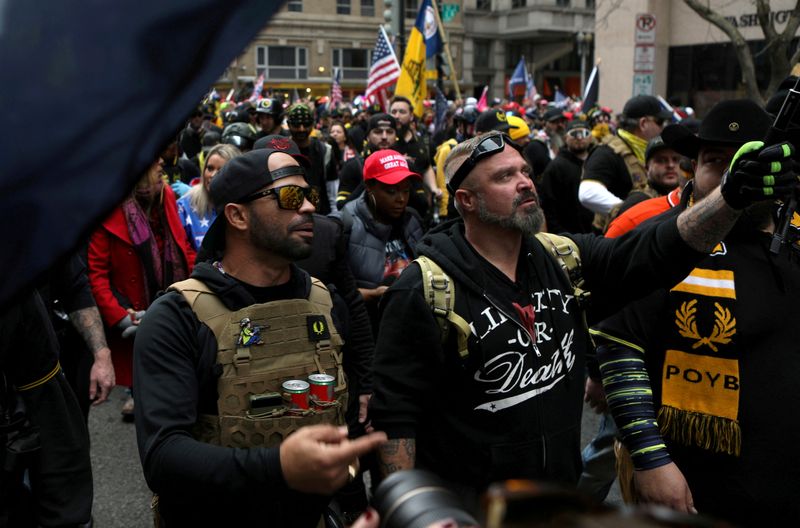U.S. judge agrees to postpone Proud Boys trial amid Jan. 6 Capitol riot hearings
2022.06.22 21:45
2/2

FILE PHOTO: Proud Boys members Enrique Tarrio, left, and Joe Biggs march during a December 12, 2020 protest in Washington, D.C. REUTERS/Jim Urquhart
2/2
By Sarah N. Lynch
WASHINGTON (Reuters) – A federal judge on Wednesday postponed the trial for leaders of the Proud Boys facing seditious conspiracy charges for their role in storming the U.S. Capitol, amid fears that revelations during recent congressional hearings could taint the jury pool.
U.S. District Judge Timothy Kelly set a new trial date of Dec. 12, after prosecutors and attorneys for three of the Proud Boys defendants requested a delay.
In their request, they cited concerns that the high-profile hearings by the U.S. House of Representatives committee investigating the Jan. 6, 2021, Capitol attack could adversely impact the criminal trial. They also voiced fears that they will not have enough time to review potentially new evidence that could be released by the congressional panel in the coming weeks.
The trial had originally been scheduled for Aug. 8.
The defendants, including former Proud Boys leader Enrique Tarrio, are facing charges of seditious conspiracy for their alleged roles in the attack on the U.S. Capitol.
During the U.S. House Select Committee’s first hearing, televised live in prime-time, the panel showed the audience snippets of surveillance footage featuring Joseph Biggs, one of the Proud Boys defendants, as well as excerpts from the deposition of Tarrio.
The Justice Department last week wrote a letter renewing its plea for the committee to hand over copies of transcripts from interviews with more than 1,000 witnesses, saying its failure to do so was impeding both ongoing criminal probes and pending prosecutions.
Tarrio’s attorney on Wednesday said his client opposed postponing the trial, saying he believes Tarrio will never get a fair trial.
“Whether it’s August, December – we won’t get an impartial jury in Washington, D.C.,” said Nayib Hassan.
Kelly said he expects the trial could last up to six weeks, and would run through the holiday season “without a substantive break.”








